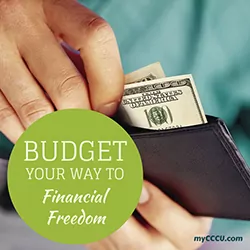
“Good planning and hard work lead to prosperity, but hasty shortcuts lead to poverty.” (Proverbs 21:5, NLT)
If you’re like most people, the word “budget” makes you cringe a little as you imagine ramen dinners and patched-up jeans. But there’s no need to fear! A budget is actually a good thing—it frees up your money so you can do more with it. With a budget, you can have the satisfaction of knowing that your money is out there working for you, rather than wondering at the end of the month where it all went.
Step 1: Check Your Cash
In order to start budgeting, you need to know exactly where you are with money. What sources of income do you have—a full-time job? Freelance work? Both?
Write down your monthly income; if you have a side job that makes a varying amount of money from month to month, put down a conservative estimate of that income. You can’t budget money you don’t have, so don’t overestimate how much is coming in.
Don’t write down unusual windfalls like tax refunds or anticipated birthday checks; those should be funneled right into paying down debt (or into savings, if you’re debt-free) if and when they show up.
Step 2: Know What You Owe
Once you’ve written down all of your income streams (estimated if necessary), you’re ready for the next step: writing down all of your current monthly financial obligations. Gather up all of your bills and any records (paper or online) you have of your credit and debit card charges.
Track all of the recurring fixed ones like rent and Internet access, as well as the regular, but often-changing, expenses like clothing, food, and utilities, and even any seasonal expenses you have like car registration or property taxes. If you make any regular payments on debts like car or student loans, be sure to include those, and write down the APR (annual percentage rate of interest) for each of those debts. Keep your expenses in categories as you write them down; this will help you to figure out how much flexibility you can build into your budget.
Step 3: Find The Leaks—And Fix Them
You may notice there are a few places where money is leaking out of your budget. Are you spending more than you should be on impulse purchases, cable TV, and lunches out—or even bank fees? Is your checking account costing you fees, or earning you interest? Are you paying high interest rates on credit cards?
Shopping around can help you find more cost-effective services, like lower costs for Internet service, credit cards with low interest rates you can transfer your balances to, or savings accounts that will help your money earn more interest. If you like your cable or satellite TV, try talking to the provider to see if they can offer you a better deal. It never hurts to ask!
Changing your expectations can help save you money, too. Instead of nights out with friends, try trading off gatherings at each other’s homes, where everyone can bring a snack to share or cook a meal together; instead of eating lunches out, plan ahead and bring lunches and snacks from home. Try borrowing or renting things you’ll only need for a limited time. Just by making a few simple changes, you can watch your savings add up and discover money you didn’t know you had!
Step 4: Set Your Goals
You’ve come a long way. You’ve figured out how much money you have, how much you owe, and how much you’ve been spending. Now, it’s time to tie it all together.
What is your biggest goal right now? Is it to pay down debt, to save for a big purchase like a house or a car, or to put money away for retirement? You may want to seek some wise financial counsel to help you decide the best way to achieve these goals, but some main points to keep in mind are:
- You need an emergency fund. It’s usually thought best to save from three to six months’ worth of monthly expenses in case of job loss or other emergency. Keep this money in an interest-bearing account like a money market account.
- You should pay yourself first. Set up direct deposit to funnel some of each paycheck into your savings and retirement accounts. Keep an eye on your budget and, whenever you get a tax refund check, raise, or unexpected bonus, put most of that cash directly into your most important investment—yourself.
- Build yourself a fun fund. Feeling like you’re pinching every penny can get tedious, so make sure to set aside a little money each month for spending on whatever you want—clothes, a special meal, a night out with friends. Don’t feel bad about spending this cash; it’s already accounted for in your budget!
By truly understanding how much money you have and where it’s going, you can unleash the full potential of every paycheck and make your money work for you. Starting a budget today can help you live your best life—now, and into the future.
This article should not be considered legal, tax, or financial advice. You may wish to consult a tax or financial advisor about your individual financial situation. Christian Community Credit Union is an Equal Housing Lender.



